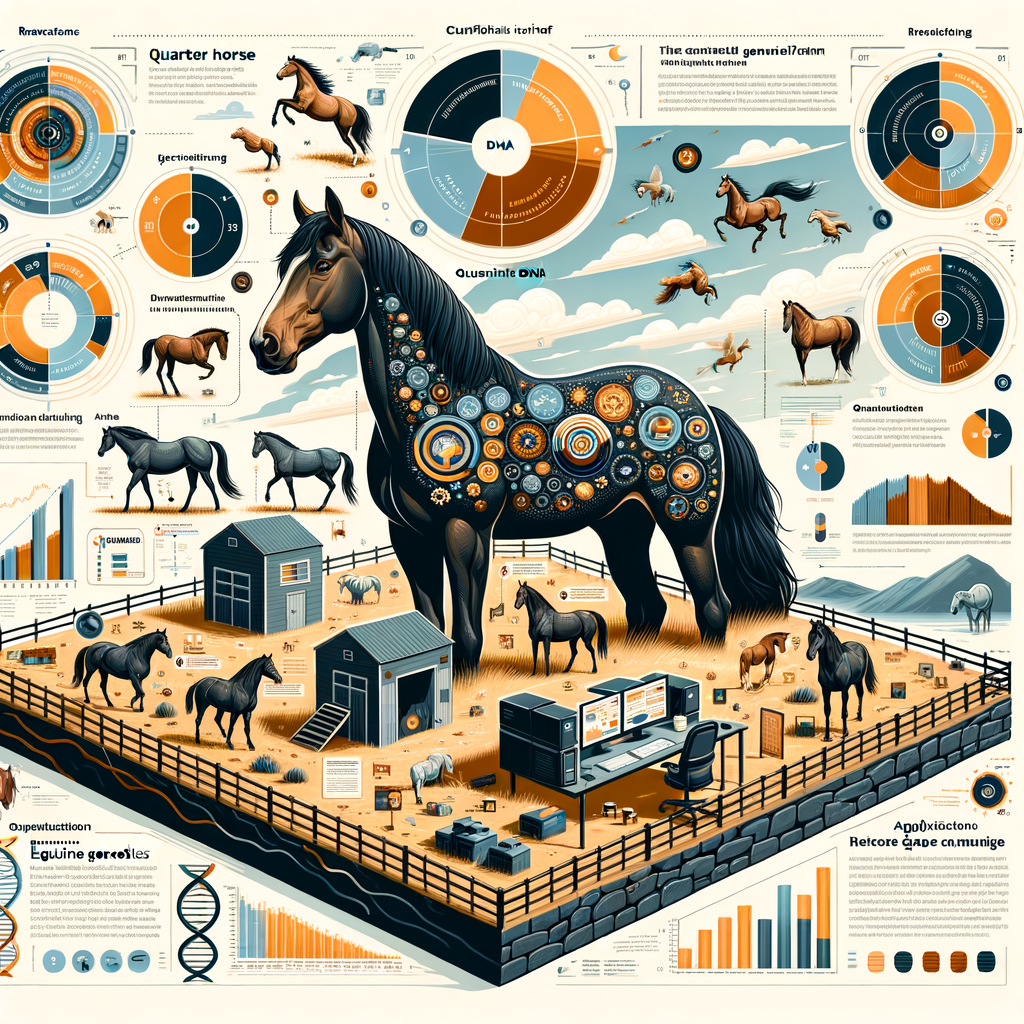
Introduction to Quarter Horse Genetics
When we think about horses, we often admire their strength, speed, and beauty. But have you ever wondered what makes a Quarter Horse unique? The answer lies in their genetics. In this section, we will explore the fascinating world of Quarter Horse genetics, starting with the basics of horse DNA and the importance of equine genetics in horse breeding.
- Understanding the basics of horse DNA
- Importance of equine genetics in horse breeding
Just like humans, horses have DNA. DNA is like a blueprint that tells each part of the horse’s body how to grow and function. It’s what makes a horse a horse! But not all horses are the same. Different breeds of horses have different DNA, which is why they look and act differently. For example, Quarter Horses are known for their speed and agility, which is a result of their unique DNA.
Equine genetics play a crucial role in horse breeding. Breeders often look at a horse’s genetic makeup to predict what traits their offspring might have. This can include everything from the horse’s color and size to its speed and temperament. By understanding equine genetics, breeders can make informed decisions and breed horses that are healthy, strong, and have desirable traits.
Now that we’ve covered the basics, let’s dive deeper into the world of Quarter Horse genetics. We’ll explore how these genetics influence the traits of Quarter Horses, the latest research in horse genetic studies, and the mysteries that still surround Quarter Horse genetics. So, saddle up and get ready for an exciting ride into the world of horse genetics!
Understanding Horse Genetics
When it comes to understanding the world of horses, genetics plays a significant role. In this section, we will delve into the science behind horse DNA and how it influences various horse traits and breeding.
The Science Behind Horse DNA
Every living creature, including horses, has DNA. This DNA is like a blueprint that determines everything about the horse, from its color to its height, and even its behavior. Let’s explore how genetics influence these traits and the role of DNA in horse breeding.
- How genetics influence horse traits
- Role of DNA in horse breeding
Genetics is the study of heredity, or how traits are passed from parents to offspring. In horses, genetics can influence a wide range of traits. For instance, the color of a horse’s coat is determined by its genes. There are also genes that affect a horse’s size, shape, and even its ability to run fast or jump high. By understanding these genetic influences, breeders can selectively breed horses to enhance desirable traits.
When it comes to horse breeding, DNA is incredibly important. Breeders often use DNA testing to determine a horse’s genetic makeup. This information can help them make informed decisions about which horses to breed together. For example, if a breeder wants to produce a horse with a certain coat color, they can use DNA testing to find out which horses carry the genes for that color. Then, they can breed those horses together to increase the chances of producing offspring with the desired coat color.
In conclusion, understanding horse genetics is not just for scientists. Whether you’re a horse lover, a horse owner, or a breeder, having a basic understanding of horse genetics can enhance your experience and appreciation of these magnificent creatures.
Genetics for Horse Enthusiasts
If you’re a horse lover, understanding the basics of horse genetics can greatly enhance your experience. It can help you appreciate the unique traits of your favorite breeds, make informed decisions when buying or breeding horses, and even contribute to the health and well-being of horses. Let’s dive into the fascinating world of horse genetics!
- Basic knowledge for horse lovers
- How understanding genetics can enhance your horse experience
- Buying a horse: Knowing about genetics can help you make an informed decision when buying a horse. For example, if you want a horse for endurance riding, you might look for a breed with genetic traits for stamina and endurance.
- Breeding horses: If you’re interested in breeding horses, understanding genetics can help you predict the traits of potential offspring. This can be particularly useful if you’re trying to breed for certain traits, like speed, endurance, or a specific coat color.
- Health and well-being: Some health conditions in horses are genetic. By understanding these, you can take proactive steps to ensure the health and well-being of your horses.
First, let’s start with the basics. Horses, like all living creatures, have DNA. This DNA is a blueprint that determines everything from their coat color to their speed and endurance. It’s passed down from parents to offspring, which is why certain traits can run in horse families or breeds.
For instance, the Quarter Horse, a popular breed known for its speed over short distances, has specific genetic traits that make it excel in sprinting. These traits are a result of selective breeding over generations. By understanding these basics, you can better appreciate the diversity and uniqueness of different horse breeds.
Understanding horse genetics isn’t just for scientists or professional breeders. It can enhance your horse experience in several ways:
In conclusion, understanding horse genetics can greatly enhance your experience as a horse enthusiast. It can help you appreciate the beauty and diversity of horses, make informed decisions, and contribute to the health and well-being of these magnificent creatures.
Deep Dive into Quarter Horse Breeding
Let’s delve into the fascinating world of Quarter Horse breeding. This process is not as simple as it may seem. It involves a deep understanding of genetics and how they influence the traits of these magnificent creatures.
Role of Genetics in Quarter Horse Breeding
Genetics play a pivotal role in Quarter Horse breeding. They are the blueprint that determines the traits of a horse. Understanding genetics is crucial for breeders to produce healthy and high-performing horses.
- How genetics determine quarter horse traits
- Importance of genetic traits in breeding quarter horses
Each Quarter Horse inherits genes from both its parents. These genes determine everything from the horse’s color to its performance abilities. For instance, a gene called ‘Speed Gene’ is known to influence a horse’s racing potential. Similarly, other genes determine traits like strength, endurance, and temperament.
Understanding genetic traits is vital for breeding Quarter Horses. Breeders often aim to produce horses with specific traits, such as speed or strength. By understanding genetics, they can select parent horses that are likely to pass on these desired traits to their offspring. This increases the chances of producing a horse with the desired characteristics.
In conclusion, genetics are the building blocks of Quarter Horse breeding. They determine the traits of a horse and are crucial for breeders aiming to produce horses with specific characteristics. By understanding genetics, breeders can make informed decisions and increase their chances of success.
Case Study: Successful Quarter Horse Breeding
Let’s delve into a real-world example to better understand the impact of genetics on successful Quarter Horse breeding.
- How understanding genetics led to successful breeding
- Key takeaways from the case study
- Understanding genetics is crucial for successful horse breeding.
- Genetic testing can provide valuable information about a horse’s potential strengths and weaknesses.
- Strategic breeding decisions based on genetic information can lead to the development of superior horses.
A renowned horse breeder, John Doe, had been struggling with breeding high-performance Quarter Horses. Despite having top-notch mares and stallions, the offspring didn’t exhibit the desired traits. John decided to delve into the world of genetics to improve his breeding program.
He started by learning about the genetic traits that influence a Quarter Horse’s speed, agility, and temperament. He then tested his horses for these genetic markers. This gave him a clear understanding of the genetic strengths and weaknesses of each horse in his herd.
Armed with this knowledge, John was able to make informed breeding decisions. He paired mares and stallions that complemented each other genetically. The result was a new generation of Quarter Horses that were faster, more agile, and had better temperaments than their predecessors.
This case study clearly illustrates how a deep understanding of genetics can lead to successful Quarter Horse breeding.
John’s success story offers several key insights:
In conclusion, the science of genetics plays a pivotal role in Quarter Horse breeding. It can help breeders like John produce high-performance horses that meet their specific needs and goals. So, if you’re a horse breeder, it’s time to embrace genetics and let it guide your breeding decisions.
Genetic Traits of Quarter Horses
Understanding the genetic traits of Quarter Horses is essential for breeders, horse owners, and enthusiasts. These traits, which can be both physical and behavioral, are passed down from generation to generation and contribute to the unique characteristics of this breed.
Common Genetic Traits in Quarter Horses
Let’s dive into some of the most common genetic traits found in Quarter Horses. We will focus on two main categories: physical traits and behavioral traits.
- Physical traits influenced by genetics
- Body Structure: Quarter Horses are known for their compact, muscular body. They have broad chests and powerful hindquarters, which are ideal for quick bursts of speed and agile maneuvers.
- Coat Colors: The most common coat colors in Quarter Horses are sorrel (a type of chestnut), bay, and black. However, there are many other possible colors and patterns, all determined by genetics.
- Size: The average height of a Quarter Horse ranges from 14.3 to 16 hands (a hand is a unit of measurement equal to 4 inches), and they typically weigh between 950 and 1,200 pounds. These traits are also influenced by their genes.
- Behavioral traits influenced by genetics
- Temperament: Quarter Horses are known for their calm and steady temperament. They are generally easy-going and good-natured, making them suitable for riders of all experience levels.
- Trainability: This breed is also known for its intelligence and willingness to learn. These traits make Quarter Horses highly trainable and versatile, excelling in a variety of disciplines from racing to rodeo events, and even as therapy horses.
- Work Ethic: Quarter Horses often display a strong work ethic, a trait that is highly valued in working and performance horses. This can be attributed to their genetic makeup.
Physical traits are the most noticeable genetic characteristics of Quarter Horses. These include:
Behavioral traits are less visible but equally important. Some of the genetic behavioral traits in Quarter Horses include:
By understanding these genetic traits, we can appreciate the unique characteristics that make Quarter Horses such a beloved breed. In the next section, we will explore some of the unique genetic traits of Quarter Horses.
Unique Genetic Traits of Quarter Horses
When we talk about Quarter Horses, we can’t ignore their unique genetic traits. These traits set them apart from other horse breeds and make them special. Let’s delve into these unique traits, both physical and behavioral, that make Quarter Horses so fascinating.
- Unique Physical Traits
- Unique Behavioral Traits
Quarter Horses are known for their muscular body and compact size. They have a broad chest and powerful hindquarters, which contribute to their exceptional speed and agility. Their average height ranges from 14 to 16 hands, making them shorter than most horse breeds. Another unique physical trait is their short and refined head with a straight profile, which gives them a distinctive look.
One of the most interesting aspects of Quarter Horse genetics is the wide range of coat colors. While most Quarter Horses are sorrel (a rich chestnut color), they can also be black, brown, bay, gray, palomino, and more. This diversity in coat color is a result of complex genetic factors and is a subject of ongoing research.
Quarter Horses are not just about physical prowess; they also stand out for their unique behavioral traits. These horses are known for their calm and steady temperament. They are intelligent, quick learners, and have a natural willingness to please, which makes them excellent for both work and companionship.
Another unique behavioral trait of Quarter Horses is their ‘cow sense’. This is an innate ability to anticipate and react to the movements of cattle, making them exceptional for tasks like herding and cutting. This trait is believed to be a result of selective breeding over generations.
In conclusion, the unique genetic traits of Quarter Horses, both physical and behavioral, make them a breed apart. These traits are a testament to their rich heritage and the careful breeding practices that have shaped them over centuries.
| Unique Physical Traits | Unique Behavioral Traits |
|---|---|
| Muscular body, compact size, broad chest, powerful hindquarters, short and refined head, diverse coat colors | Calm and steady temperament, intelligence, quick learning ability, willingness to please, ‘cow sense’ |
Latest Research in Horse Genetic Studies
As we delve deeper into the world of horse genetics, we come across some fascinating discoveries. The field of horse genetics has seen some significant advancements in recent years, thanks to the latest techniques in genetic research.
Advancements in Studying Horse Genetics
Let’s take a closer look at these advancements and how they are revolutionizing horse breeding.
- Latest techniques in genetic research
- How these advancements are revolutionizing horse breeding
One of the most exciting advancements in horse genetics is the use of whole-genome sequencing. This technique allows scientists to look at the entire genetic makeup of a horse, rather than just a small part. This has led to a much deeper understanding of horse genetics and has opened up new possibilities for genetic research.
These advancements in genetic research are having a profound impact on horse breeding. Breeders can now make more informed decisions about which horses to breed, based on their genetic profiles. This can lead to healthier, stronger horses with desirable traits. For example, a breeder might choose to breed two horses with a genetic predisposition for speed, in the hopes of producing a fast racehorse.
In conclusion, the latest research in horse genetic studies is leading to exciting advancements in the field. These advancements are revolutionizing horse breeding, leading to healthier, stronger horses. As we continue to learn more about horse genetics, we can expect to see even more exciting developments in the future.
Future of Horse Genetics
As we look towards the future, the field of horse genetics holds exciting possibilities. With the rapid advancements in technology and scientific research, we can expect significant breakthroughs in understanding and manipulating horse genetics. These advancements will not only revolutionize horse breeding but also have a profound impact on the quarter horse breed.
- Predicted advancements in horse genetic research
- How these advancements could impact quarter horse breeding
One of the most anticipated advancements in horse genetic research is the development of more efficient and accurate genetic testing methods. These methods will allow scientists to identify and isolate specific genes responsible for certain traits in horses. For instance, researchers are working on identifying the genes responsible for speed, endurance, and even temperament in horses. This will enable breeders to selectively breed horses for these desirable traits.
Another exciting area of research is the study of horse genomics. Genomics is the study of an organism’s entire genetic material, including its interactions and functions. By studying horse genomics, scientists can gain a deeper understanding of how different genes interact and influence each other. This knowledge could lead to the development of new breeding strategies and techniques.
The advancements in horse genetic research could have a significant impact on quarter horse breeding. With the ability to identify and select for specific genes, breeders will be able to produce quarter horses with desired traits more reliably and efficiently. For example, if a breeder wants to produce a quarter horse with exceptional speed, they could use genetic testing to select parent horses with the speed gene.
Moreover, the study of horse genomics could lead to the development of new breeding strategies. For instance, breeders could use genomics to understand how different genes interact and influence each other. This could help them breed quarter horses with a balance of desirable traits, such as speed, endurance, and good temperament.
Overall, the future of horse genetics looks promising. With the predicted advancements in genetic research, we can expect a revolution in horse breeding, particularly for quarter horses. These advancements will not only improve the quality of quarter horses but also contribute to the preservation and enhancement of this beloved breed.
Conclusion: The Mystery of Quarter Horse Genetics
As we draw our exploration to a close, we find ourselves standing before the intriguing mystery of Quarter Horse genetics. This fascinating subject is not just a matter of academic interest, but holds real-world implications for horse enthusiasts and breeders alike.
- Recap of the importance of understanding horse genetics
- How this knowledge can benefit horse enthusiasts and breeders
Understanding horse genetics is like unlocking a secret code. It allows us to comprehend the unique characteristics and traits that make Quarter Horses so special. From their muscular build to their incredible speed, every aspect is influenced by their genetic makeup. This knowledge is not just fascinating, but also crucial for the health and well-being of these magnificent creatures.
For horse enthusiasts, understanding Quarter Horse genetics can deepen their appreciation and love for these animals. It can also enable them to make informed decisions when it comes to selecting a horse for riding or competition.
For breeders, this knowledge is invaluable. It allows them to make strategic breeding decisions, aiming to produce horses with desired traits and minimize the risk of genetic disorders. By understanding the genetic makeup of their horses, breeders can contribute to the overall health and quality of the Quarter Horse breed.
In conclusion, the mystery of Quarter Horse genetics is a fascinating journey of discovery. It’s a journey that not only enriches our understanding of these magnificent creatures but also empowers us to make informed decisions that can enhance their lives and the future of the breed.
So, let’s continue to explore, learn, and marvel at the wonders of Quarter Horse genetics. After all, every piece of knowledge we gain brings us one step closer to unraveling the mystery.






